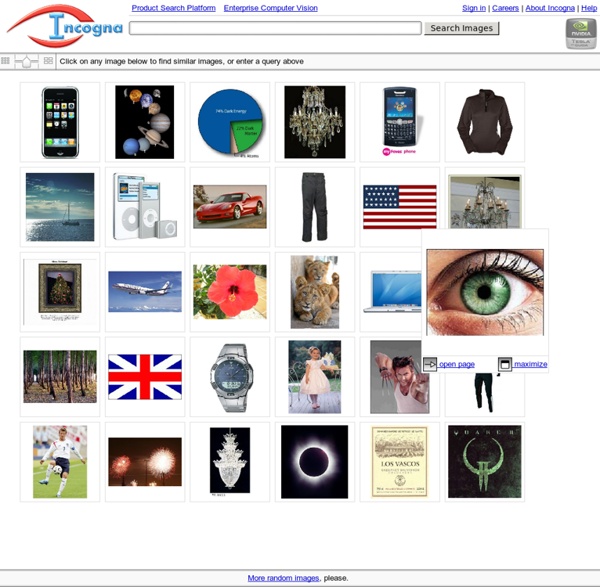



http://www.incogna.com/#random
Top 100 Education Blogs Education blogs are becoming a means for educators, students, and education administrators to interact more effectively than ever before. They are also a great resource for those searching for the best online education programs to jumpstart their teaching careers. Technorati currently tracks 63.1 million blogs. More than 5,000 of them are about education. List of academic databases and search engines Wikipedia list article This page contains a representative list of notable databases and search engines useful in an academic setting for finding and accessing articles in academic journals, institutional repositories, archives, or other collections of scientific and other articles. Databases and search engines differ substantially in terms of coverage and retrieval qualities.[1] Users need to account for qualities and limitations of databases and search engines, especially those searching systematically for records such as in systematic reviews or meta-analyses.[2] As the distinction between a database and a search engine is unclear for these complex document retrieval systems, see: the general list of search engines for all-purpose search engines that can be used for academic purposesthe article about bibliographic databases for information about databases giving bibliographic information about finding books and journal articles. Operating services[edit] See also[edit]
The Invisible Web What is the Invisible Web? How can you find it online? What makes the Invisible Web search engines and Invisible Web databases so special? Find out the answers to these questions and learn more about this section of the Web that's so much larger than what you can uncover with an ordinary Web search.
Let's Play Math! [Feature photo above: Clifford Attractor by Yami89 (public domain) via Wikimedia Commons.] Alexandria Jones collapsed onto the couch with a dramatic sigh. Her father, the world-famous archaeologist Dr. Fibonacci Jones, glanced up from his newspaper and rolled his eyes. 99 Resources to Research & Mine the Invisible Web College researchers often need more than Google and Wikipedia to get the job done. To find what you're looking for, it may be necessary to tap into the invisible web, the sites that don't get indexed by broad search engines. The following resources were designed to help you do just that, offering specialized search engines, directories, and more places to find the complex and obscure. Search Engines Whether you're looking for specific science research or business data, these search engines will point you in the right direction.
Visual Search Results - The Most Interesting Ways To Visually Explore Search Engine Results 1. Grokker Grokker is a web-based search engine that allows you to explore your results in a visual fashion. Your results are displayed both in a standard outline and in a dynamic map you can interact with. Fun 4 the Brain - English Games English Excitement! Panda Mayhem This fun English game has some silly pandas to help teach the parts of speech. Get enough of the questions correct, and you can make your own silly sentence.
100 Useful Tips and Tools to Research the Deep Web By Alisa Miller Experts say that typical search engines like Yahoo! and Google only pick up about 1% of the information available on the Internet. The rest of that information is considered to be hidden in the deep web, also referred to as the invisible web. So how can you find all the rest of this information? This list offers 100 tips and tools to help you get the most out of your Internet searches.